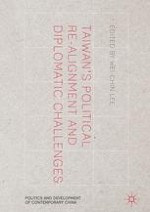2019 | OriginalPaper | Buchkapitel
7. Consensus Found and Consensus Lost: Taiwan’s 2016 Election, the “1992 Consensus,” and Cross-Strait Relations
verfasst von : Wei-chin Lee
Erschienen in: Taiwan’s Political Re-Alignment and Diplomatic Challenges
Verlag: Springer International Publishing
Aktivieren Sie unsere intelligente Suche, um passende Fachinhalte oder Patente zu finden.
Wählen Sie Textabschnitte aus um mit Künstlicher Intelligenz passenden Patente zu finden. powered by
Markieren Sie Textabschnitte, um KI-gestützt weitere passende Inhalte zu finden. powered by
